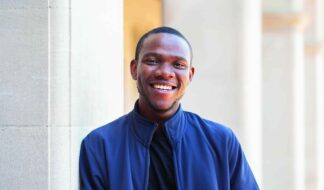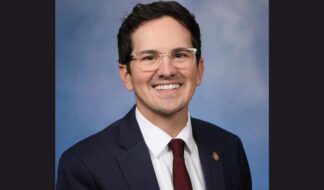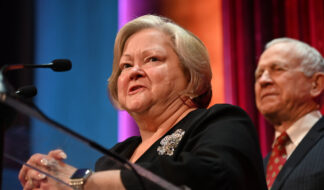He Won Lots of Netflix Money. He Used It To Make a Very Queer Movie in Detroit.
Sam Meier on his shockingly normal, accidentally political trans film ‘T-Minus’
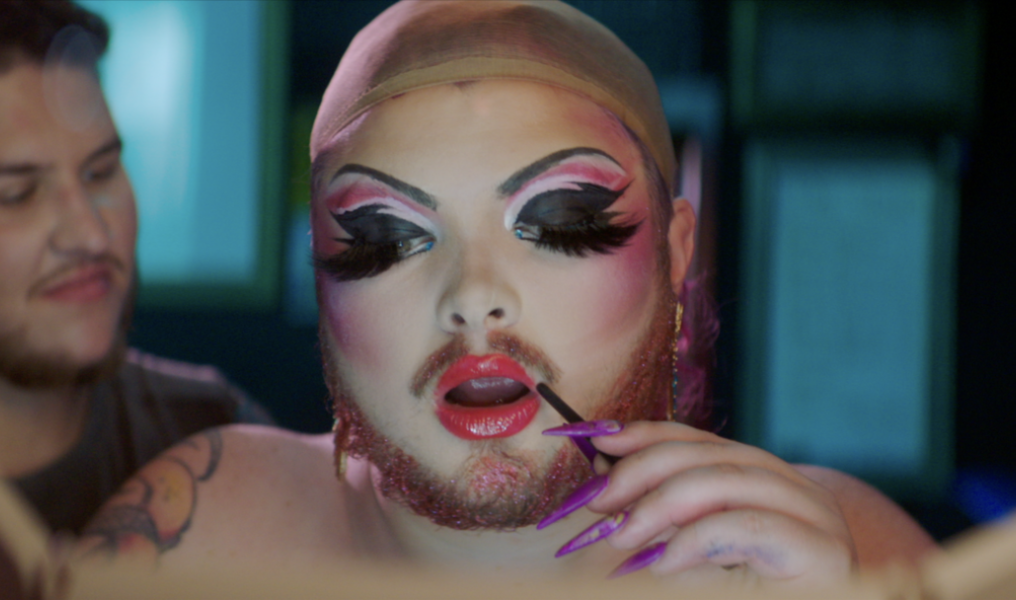
When filmmaker Sam Meier won a cool 100 grand on the Netflix gameshow “Bullshit” in 2021, it didn’t take long for him to choose what he’d do with all that money.
“I decided pretty quickly that if I didn’t invest in my art, I wasn’t really about that life,” says Meier, who uses he/she pronouns. “This was my opportunity to really be able to put some juice behind the short films I’d been making in the Detroit scene for years.”
After the show “unceremoniously dropped a hundred thousand dollars in my account — no taxes taken out,” Meier says he had to take the day off work. “I had a mental breakdown that day.”
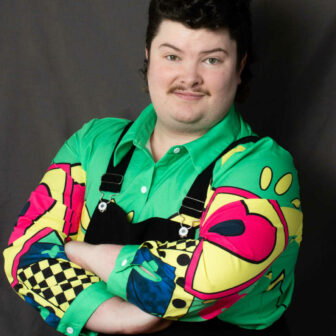
After the dust settled and the taxes got paid, Meier took a headfirst dive into a massive project, completing his 12-minute rom-com meets road trip meets harrowing personal drama, “T-Minus.” The money gave him access to resources like a Hollywood director, Emily Lerer, who flew in for the production and oversaw a sprawling shoot that covered classic Midwestern scenery and instantly recognizable urban Detroit scenes. Meier had connected with Lerer, whose resume includes directorial positions with HBO, Sony and Warner Bros., on the festival circuit for an earlier film.
As a queer woman, Lerer, like the other “T-Minus” production team members, falls outside the typical cisgender, straight, white male demographic that dominates the film industry. “I really wanted to focus on working with people who are traditionally excluded from the industry,” Meier explains. “My leadership team was almost entirely queer or of color. And ultimately, it was just good vibes. It was incredible. And that’s even though we had the worst production experience.”
By the time the filming actually started, Meier says the crew had gone through a series of directors of photography, including one who left on the first day of shooting. L.A. cinematographer Jeffrey Carolan wound up serving in the role after the “T-Minus” team contacted him in a near-panic while he was at Disneyland with his family. “We’re basically in tears, on like the third or fourth day of replacing our director of photography. And we’re like, ‘Jeff, can you please fly out tonight and start shooting tomorrow morning?’”
It may have been a messy road to getting Carolan on board with the project, but Meier says Carolan’s work on dozens of Hallmark movies would help to inform an ideal tone for the film, which manages to comingle a romantic comedy vibe with a trans-centered storyline focused on a highly controversial topic: abortion.
In the film, lead character Andrew, a trans man, discovers he’s pregnant — the result of a Grindr hookup with Meier’s Lex, a larger-than-life drag queen who needs a little convincing to accompany Andrew to get an abortion at a Planned Parenthood in Detroit, where there are fewer restrictions than in their home state, Ohio.
The pair take off on a road trip that starts with an awkward vibe. As the miles tick by along two-lane country lanes and a fun stop at a quirky roadside diner, the awkwardness fades. Lex and Andrew get to know each other, and it’s clear a real connection has been made. Soon, they’ve advanced past one-night hookup status to… something else entirely, though we are still left with open-ended questions by the end of the short.
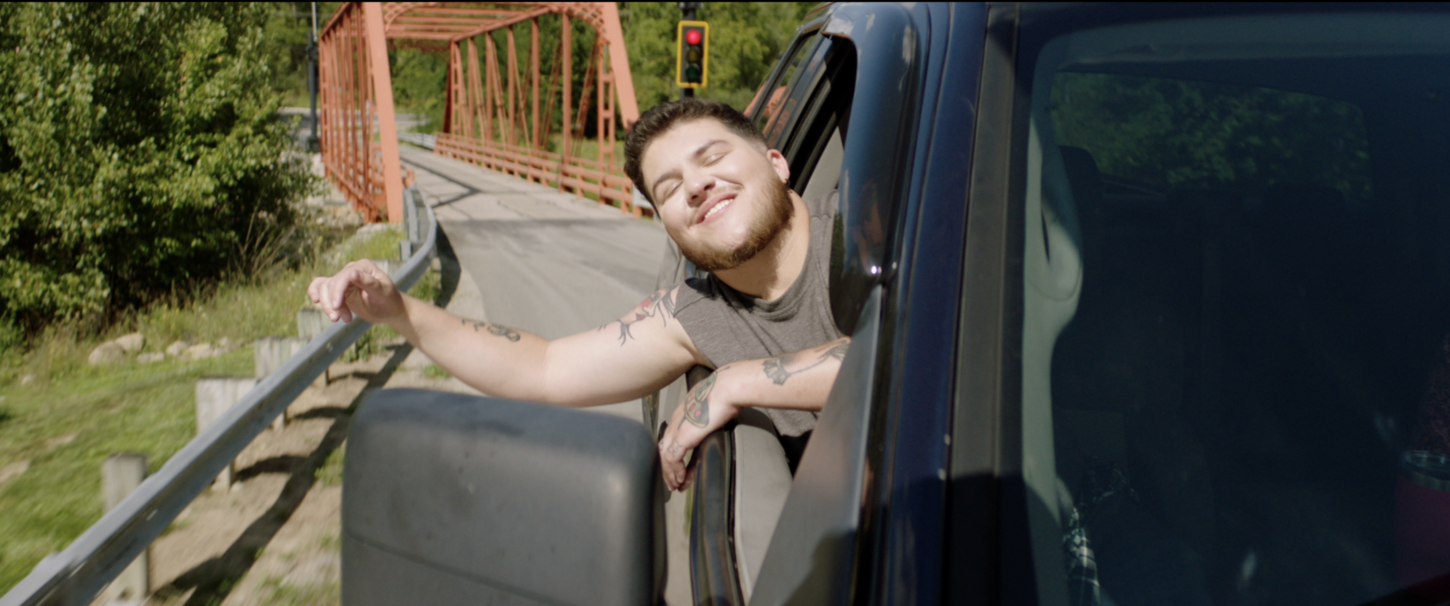
No doubt the film touches on several hot button political topics, including the mere existence of the trans community, which has triggered rightwing politicians to the point of absurdity over the past several months. While Meier says he wasn’t nervous about how audiences might react to the film, he was curious.
At the Oscar-qualifying Cleveland International Film Festival in March, reactions were all over the place. “From laughing to shocked to people who were vocalizing as they processed what they were seeing,” he recalls. “You could hear people thinking aloud and adjusting, and then we had so many people come up to us after screenings and say, like, ‘This changed my way of looking at this issue. I’ve never seen anything like this on camera before.’ Really, though, I think no matter how you identify, there’s a very human story at the root of this all that anyone can identify with.”
Meier says he based the characters on people from his real life and built a story around them. “It’s funny how that reality is something so shocking to some people and yet so everyday for queer people,” he says.
As a screenwriter, Meier frequently draws from his lived experience, which includes growing up in a religious cult in Wisconsin, a formative set of childhood memories that includes his family surviving a serious bus crash in Bosnia, where the cult had traveled to witness a vision of the Virgin Mary that locals had reported. The accident left Meier’s father partially paralyzed, and while the family left the cult soon after, no longer willing to participate in the “right wing, hyper-conservative Christian” nature of the group, the experience left a permanent mark.
Today, Meier often weaves autobiographical elements into his stories, partly as catharsis but also because stories about people like him are rare. “I’ve been rejected a lot through the course of this career, and it’s part of the reason why I really started pursuing screenwriting,” he explains. “I wanted bigger and better roles than I was being offered. I am a plus-size, flamboyant, queer person. And I see that for a lot of my friends, too — people aren’t necessarily thinking of us because they don’t come from our communities.”
“So I’m less concerned about people’s responses to the characters that they see on screen or the people who, I mean, if they don’t get it, they don’t get it… but on the other side of the that, we are emailing festivals in red states to ask if it’s even legal for us to attend, so there’s that.”
So far, Meier says they haven’t been warned off from attending or even from attending in drag, but despite lots of apologies from film festival organizers about what’s happening in various state legislatures, he’d like to see more attention on security at events. “You’re sorry, but who are your security managers?” he wonders.
Still, he isn’t willing to change how he presents on the festival circuit. “My appearance is very loud for film festivals, but also I’m very prepared to dance on every public monument in Tennessee if we get into Nashville, as one example.”
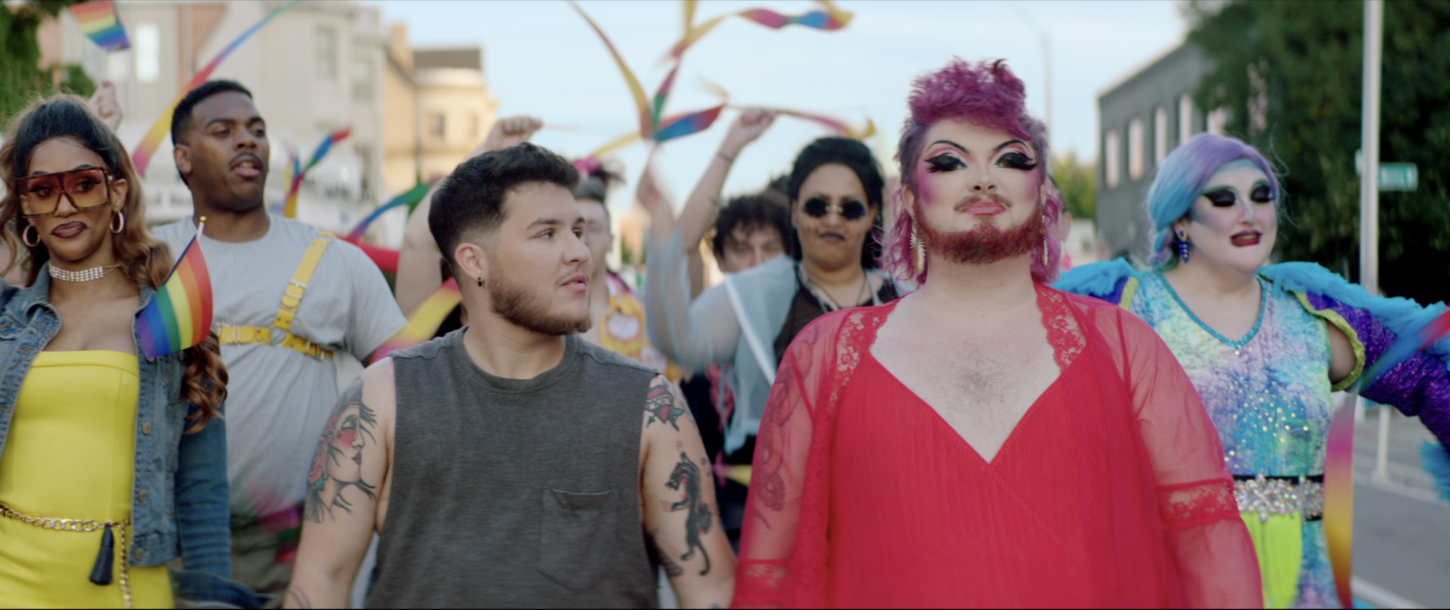
When “T-Minus” was in production, it was prior to the flurry of hundreds of anti-trans and anti-LGBTQ+ flooding state houses across the country. “Was I expecting the world to fall apart? Nope. I think one reason Planned Parenthood was so willing to work with me is that I started emailing them before Roe V. Wade was overturned. We had no idea that was going to happen.”
Meier said the intent all along was to create a “cute rom-com” with queer characters, which, he says is a political message in and of itself. In the wake of all the political frenzy, he thinks the film has become more relevant. “And that’s unfortunate,” he adds.
Looking ahead, Meier hopes to secure funding to expand the short to a full-length feature shot in Detroit and Ohio. If Hollywood turns him down, he’s open to fundraising on his own. “I take a lot of inspiration from [‘Insecure’ creator] Issa Rae,” he says. “She was the one who galvanized me to start producing my own work. She said in an interview that no one in the industry was giving a woman like her the opportunities she was looking for, so she went out and she made them herself.”
“I’ve had producers tell me that I can’t make LGBT content if I want to make money, and I kindly said, ‘You can go f yourself,’” Meier adds. “I’ve been doing it without them, and I will continue to do so without them.”
Hollywood funding or not, Meier is not about to stop prioritizing queer inclusion in his productions. He mentions reading about a study regarding why people become famous.
“The only identifying factor for famous artists, in particular, was being friends with other famous artists. Groups of artists rise together, which is part of the reason that community and working with the kind of people I want to work with is so important to me,” he says. “I’m really interested in having the community rise together rather than just trying to claw my way to the top.”




